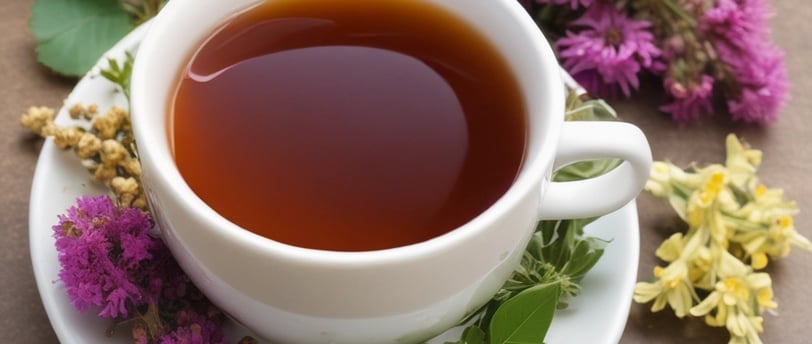Think delicious, healthy teas, handmade crafts, and amazing products made with herbs and organic ingredients straight from the farm. We're all about natural living and wholesome goodness
Establish a daily tea ritual that supports your health goals.
3/28/20252 min read


So, you're curious about making a daily cuppa a regular thing? I'm all for it! Let's talk about why sneaking in a bit of tea time each day could brighten your world. It's not just about the warm fuzzy feeling (though that's definitely a plus!), think of it as a little moment of self-care sprinkled into your day. A chance to pause, breathe, and enjoy something delicious. Plus, there's a whole world of tea flavors to explore—from calming chamomile to zingy green tea, finding your perfect cup is half the fun! Maybe it's the perfect way to start your morning or a cozy way to unwind in the evening. Whatever works for you! Think of it as a small act of kindness, just for you. Let's chat more about your tea preferences – what are you thinking?
The integration of tea into a daily wellness routine offers numerous potential benefits. While tea consumption is less prevalent in the United States compared to some European countries, where it often serves as a beverage of hospitality, its potential extends far beyond mere social customs. We should consider its broader applications for health and well-being.
Herbal Teas
Herbal teas, also known as herbal infusions or tisanes, are created by steeping various dried plant materials—herbs, flowers, fruits, and spices—in hot water. A key distinction from traditional teas lies in their caffeine content: herbal teas are naturally caffeine-free. This characteristic, combined with the diverse properties of various botanicals, makes them suitable for supporting various aspects of health.
Tea Health Benefits
The health benefits attributed to tea, particularly herbal varieties, are multifaceted. Research suggests that tea's high antioxidant content may contribute to lowering cholesterol levels, aiding in weight management, reducing inflammation, and supporting bone and skin health. Specific herbal teas, depending on their composition, may offer additional benefits, such as stress reduction, improved digestion, and relief from cold/flu symptoms. For example, turmeric-based teas demonstrate anti-inflammatory properties, while rose hip tea, with its pleasant aroma and taste, is rich in vitamins and antioxidants. Hibiscus flower teas are often cited for their potential to support healthy blood pressure.
Common herbal tea ingredients include a wide array of plants, each with purported properties. It's crucial to understand that while research suggests potential health benefits associated with specific ingredients, herbal teas are not pharmaceutical medications and their efficacy in home brewing may vary.
Safety
Regarding safety, the ingredients in most herbal teas are generally recognized as safe for consumption. However, individuals with allergies or those taking medications should exercise caution and consult their healthcare provider before regularly incorporating herbal teas into their diet, particularly during pregnancy or breastfeeding. Potential drug interactions should be carefully considered.
Conclusion
In conclusion, the incorporation of herbal teas into a daily routine can offer a path toward improved well-being. Whether enjoyed as a refreshing beverage during busy days or a calming ritual in the evening, choosing the appropriate tea for each occasion allows for both physical and mental refreshment, promoting a more holistic and mindful approach to wellness.
